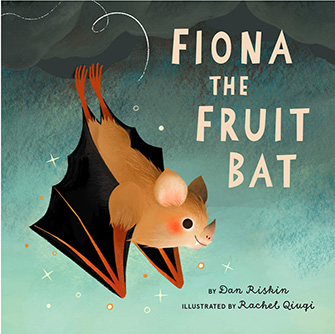Gone Batty
by Paul Fraumeni
photography by mike ford
In a change of pace from his usual work as a respected science journalist, York alumnus Dan Riskin (MSc ’00) has just published a children’s book. It’s about a baby bat that is afraid to take its first leap into flight.
Fiona the Fruit Bat took Riskin a couple of years to write with illustrator Rachel Qiugi. But the story actually got started two decades ago in a tropical rainforest, before Riskin had a career where he would regale the likes of Jay Leno with science stories, before he was a prime-time TV host himself, before he had any notion that he would someday be a children’s book author.
York University, where Riskin studied biology as a post-graduate student, planted the seed.

One of the only evolutionary biologists to become a household name, Riskin had been fascinated by bats since he was a boy growing up in Edmonton. That passion became the pathway to an illustrious career after renowned bat expert Brock Fenton, then a professor at York, sent Riskin on a study trip to Costa Rica, where the University has a campus in the rainforest. It pretty much launched Riskin’s career as a bat scientist. It also gave him the moment that eventually led him, many years later, to write his children’s book.
I had this real sense of bliss, this feeling that I can’t believe I get to do this
In May 1999, while doing research in Costa Rica, Riskin stuck his head in a very tight cave in the country’s northeast. It wasn’t the kind of cave you could easily walk into – Riskin really had to squeeze into it. Once he got his head into the cave, he looked up and saw a short-tailed fruit bat. It was staring back at him and wiggling its nose. That’s what bats do when they use their superpower, echolocation. Then something powerful happened.
“It looked at me and I looked back at it,” Riskin vividly recalls. “I had this real sense of bliss, this feeling that I can’t believe I get to do this. I’ve always remembered that image in my mind.”
A few years later, in 2019, Riskin realized that image was something he could build on. He’d spent two decades developing a successful career as a science communicator – host of the Discovery Channel’s Daily Planet, and a host on Animal Planet, a guest on big-time talk shows such as Leno and The Late Late Show with Craig Ferguson, author of the critically acclaimed 2014 book Mother Nature is Trying to Kill You, and a busy science reporter for CTV News.

Then a friend got him together with Greystone, a Vancouver-based publisher that does a lot of work in children’s books.
Riskin and Greystone’s editors then started talking, sharing ideas on how he might use his biology knowledge and storytelling talent for a young audience. Riskin liked the idea. “My goal as a science communicator isn’t necessarily to get people to understand science,” he says, “it’s to get them to like science and feel science is a good use of their tax dollars. And a big part of that is how kids are introduced to science.”
Its mom says, ‘It’s going to be fine. Just use your own hearing and you’ll know what to do.’ And the baby bat does that, it takes this leap of faith
While figuring out what he should write, Riskin thought back on his years as a York grad student, when he had first learned that when bats are babies, they don’t know how to echolocate. They develop the ability to find their way in the dark as they get older, when their mental circuitry advances to a point where they can navigate their environment using echolocation. Ruminating on this bat factoid, Riskin then thought of his own three kids, who are now grade-school age and learning to do new things, like taking public transit on their own. That’s how a story about a baby bat came to mind.
“A kid goes to the dentist, and they’re scared,” Riskin explains. “Their parent says, ‘It’s fine, you have nothing to worry about.’ But the kid has to experience it to get over their fear. A similar thing, I thought, happens when a young bat has to take flight. Its mom says, ‘It’s going to be fine. Just use your own hearing and you’ll know what to do.’ And the baby bat does that, it takes this leap of faith.”
Published this past September, Fiona the Fruit Bat has since become a hit.
On the day I spoke with Riskin, he was in a parking lot talking with me over the phone. He had just done a live taping of CTV’s The Marilyn Denis Show and after our call, returned home to be interviewed on CFRA, an Ottawa talk radio station.
Is children’s lit a new storytelling path for Riskin?
He isn’t sure. His whole career, he says, has always been a bit of a surprise to him.
After completing his studies at York, he moved to Victoria, B.C., intending to make documentaries. When that didn’t work out, he waited tables in restaurants. “But I missed bats and I missed travelling,” Riskin says; he then returned to university (in the U.S.) to earn a doctorate in zoology and animal biology. Soon after, a TV production company came calling.
Riskin thought he’d be an academic, but he wound up hosting a show on Animal Planet about parasites called Monsters Inside Me. Then Leno’s people called, then Ferguson’s. And when the Discovery Channel asked him to replace Jay Ingram (who was retiring) as host of Daily Planet, he committed fully to a different kind of teaching.
“I’m the last person who should give advice on how to find or change your career, but maybe I’m a good person to give advice on how to have an interesting career. And that is to just take the opportunity that’s presented to you and go for it as hard as you can.” ■